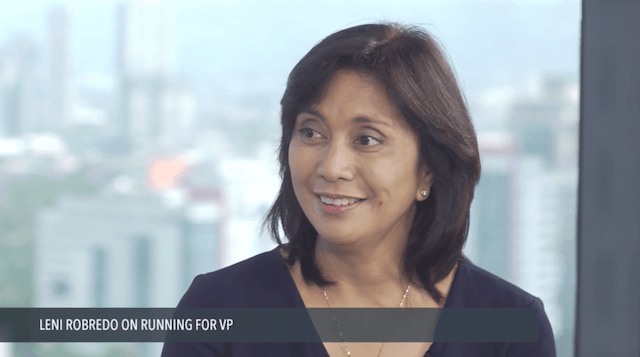SUMMARY
This is AI generated summarization, which may have errors. For context, always refer to the full article.

MANILA, Philippines – Corruption scandals and lack of transparency in government are a perennial problem in Philippine politics, but for Camarines Sur Representative Leni Robredo, there’s one other challenge that has to be addressed.
“Sa atin, may mindset na basta gobyerno, masama. (We have that mindset that government is an enemy.) It’s something we have to contend with,” Robredo said in a Rappler Talk interview on Tuesday, October 13.
The neophyte legislator said citizens tend to view themselves as mere spectators when it comes to issues of governance and public policy.
The system of government itself is also closed to people’s participation, Robredo said.
“Most of us look at ourselves as outside of government. But your engagement is very different when you look at yourself as a partner or stakeholder, when you have a sense of ownership in government programs,” she said.
“The biggest challenge is, how can government open itself up? I think the best solutions come from the people,” she added.
If elected vice president in 2016, the Camarines Sur representative said she would push for a grassroots style of governance that would emphasize citizens’ participation in the policy making processes of their government officials.
This, she said, would make citizens partners in governance instead of just beneficiaries of government assistance.
“Everyone is critical because they see government as another species. It shouldn’t be like that. The mindset has to change…If people feel that they can be part of government participation, more can be done,” she said.
Elected to office in 2013 after the death of her husband, Robredo’s first bills in Congress focused on people empowerment and transparency in government.
Last year, she filed the People Empowerment Bill of 2014, that sought to create a “People’s Council” in cities and municipalities to involve citizens in policy-making.
Robredo has said that this style of governance – where government officials are accessible to their constituents – was a hallmark of the leadership brand of her late husband, former interior secretary Jesse Robredo.
It was his death in 2012 that prompted Leni, a lawyer, to enter politics and challenge the politically-entrenched Villafuerte clan in the congressional race in Camarines Sur in 2013. (READ: Leni Robredo: Low-key political wife goes national)
Last week, after days of introspection and hesitation, Robredo finally accepted the Liberal Party’s offer to run alongside presidential bet Manuel Roxas II, with a promise to continue the good governance legacy of her husband. (READ: Leni Robredo: I can’t refuse call to serve)
Focus on rural areas
Robredo had her doubts before eventually agreeing to run for a national position. Not only were her 3 daughters against the idea, her constituents in Camarines Sur were also worried that the district will go back to the old ways of patronage politics.
In her acceptance speech, Robredo sought to ease fears that she would be neglecting her home province.
A national post, she added, would also put her in a position where she could help more people and push for her advocacies.
Asked what she would focus on if elected vice president, Robredo said she wanted to bring attention to rural areas that hardly get assistance from national government.
Key to this, Robredo said, was involving citizens in decision-making processes to find out the needs and concerns of the community.
“Hindi nabibigyan ng lalim at puso [ang serbisyo] kasi hindi nabibigyan ng grassroots participation,” she said.
(Service isn’t given depth and heart because of the lack of participation from the grassroots.)
Addressing hunger and poverty are also on her to-fix list. But Robredo said that simply launching feeding programs was not the sustainable way to solve the problem. (READ: The Leader I Want: Leni Robredo’s to-fix list for 2016)
Instead, she proposed a program, patterned after a similar model in Brazil, where the government taps farmers and local laborers to supply food for the city’s feeding programs.
Robredo also said she wanted to push for the creation of laws to improve transparency in government and to make public officials more accountable.
She is one of the authors of the House version of the Freedom of Information bill. In 2013, Robredo also filed an act that sought to require government agencies to fully disclose all financial transactions and documents of public interest. – Rappler.com
Add a comment
How does this make you feel?
There are no comments yet. Add your comment to start the conversation.